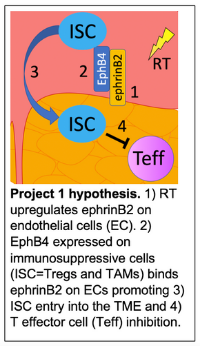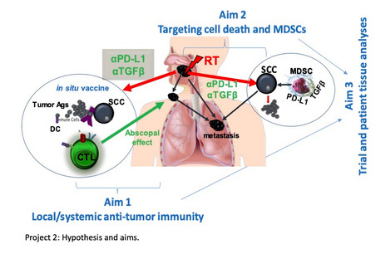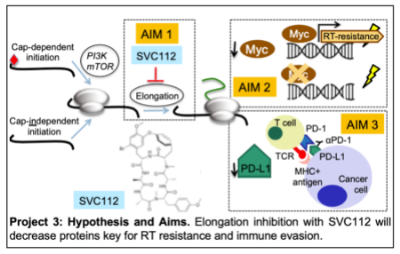
Not a researcher? Visit this page for information on head and neck cancer diagnosis, research, and treatment options.
Colorado Head and Neck Cancer SPORE
The main goal of the Colorado Head and Neck Cancer Specialized Programs of Research Excellence (SPORE) is to advance translational research to improve survival and quality of life for Head and Neck Cancer patients. The Colorado Head and Neck Cancer SPORE takes advantage of our expertise in basic and clinical sciences and uses unique model systems to identify novel molecular and cellular mechanisms of Colorado Head and Neck Cancer pathogenesis targetable by therapeutic interventions to treat all cancer types arising from head and neck anatomic sites.
The Colorado Head and Neck Cancer SPORE includes Biospecimen/Pathology, Data Science, and Administrative Cores to provide support for SPORE researchers. Additionally, there are two programs to encourage new ideas in head and neck cancer research. The Developmental Research Program (DRP) is designed to attract current Head and Neck Cancer researchers and researchers from other fields to conduct innovative research in all types of cancers arising from head and neck tissues. The Career Enhancement Program (CEP) is designed to solicit junior researchers to develop research projects to transition into independent Head and Neck Cancer researchers. We encourage underrepresented minority (URM) and people with disabilities to apply for DRP and CEP projects. Proposals for 2026 are due July 15, please click on the CEP or DRP tabs below for application information.
Biospecimen/Pathology Core

Core Director
Scott Lucia, MD
Pathology
[email protected]

Core Director
Adrie van Bokhoven, PhD
Pathology
[email protected]
The Biospecimen/Pathology Core (BPC) is essential to the success of the Colorado Head and Neck Cancer SPORE. The BPC is a central service that obtains tissues and information from patients with head and neck cancer. The collected tissue and information is stored and processed so that researchers have the best possible materials and information for their projects. In addition, the BPC provides unique skills and expertise in pathology and analysis technology to be successful in the execution of their projects.
Career Enhancement Program

Clinical Science Leader
Daniel Bowles, MD
Medical Oncology
[email protected]

Basic Science Leader
Raphael Nemenoff, PhD
Renal Med-Diseases/Hypertension
[email protected]
The Career Enhancement Program (CEP) will encourage promising candidates at the University of Colorado Cancer Center to pursue translational research careers in head and neck cancer (HNC). The CEP will provide these investigators with financial support, mentorship for scientific projects and career development, and opportunities for collaboration. The long-term goal is to foster these individuals into successful independent research careers and to incorporate them and their new ideas/projects into the Colorado HNC SPORE.
2026 CEP applications are due July 15, 2026. Instructions are here for the 2026 CEP application.
Please submit here
2025 CEP awardee:
Dr. Gina Bouchard
Assistant Professor
Department of Pharmaceutical Sciences, University of Colorado AMC
“Spatiometabolic profiling of radiotherapy outcomes in head and neck squamous cell carcinoma.”
We appreciate everyone’s interest in head and neck cancer research. A new RFA will be sent out in early 2026.
Data Science Core

Core Director
Dexiang Gao, PhD
Endocrinology
[email protected]
View Profile
The University of Colorado Head and Neck Cancer (CO HNC) SPORE Data Science Core (DSC) provides services for biostatistics, informatics, bioinformatics,
and other data science related analyses. The core includes a comprehensive team of biostatisticians, bioinformaticians, and an epidemiologist, that form a hub of researchers with the common denominator of being engaged in HNC research through
existing collaborations. The DSC will provide assistance with research hypotheses formulation, clinical trial designs, sample size determination, analytical and database design, data collection, analyses, management and storage. This support
will continue through management and coordination of accumulating research and clinical data analyses, assistance with manuscript preparation and clinical trial reports in relation to key quantitative findings and rigorous scientific conclusions.
Developmental Research Program

Clinical Science Leader
Bryan Haugen, MD
Endocrinology/Metabolism/Diabetes

Basic Science Leader
Lynn Heasley, PhD
School of Dental Medicine/Hypertension
The premise of the Developmental Research Program within the Colorado HNC SPORE application is that innovative, high-risk research from existing head and neck cancer researchers, and an influx of research from investigators with expertise outside of, but that can be applied to head and neck cancer, will catalyze significant advances in the understanding and treatment of HNC.
2026 DRP applications are due July 15, 2026. Find instructions and cover sheet for the 2026 DRP application here.
Please submit here
2025 DRP awardees:
Dr. Carissa Thomas
Department of Otolaryngology, University of Colorado AMC
“Spatial profiling of host–microbe interactions to uncover mechanisms of resistance to immunotherapy in head and neck squamous cell carcinoma”
Dr. Yu-Jui Yvonne Wan
Surgical and Radiological Sciences, University of California Davis
“Disparities in Metabolic Pathology of Head and Neck Cancer”
We would like to thank all the applicants for their hard work, we appreciate everyone’s interest in head and neck cancer research. A new RFA will be sent out in early 2026.
RFA: Funding for HNC SPORE Developmental Research Projects
The Colorado Head and Neck Cancer (HNC) SPORE will fund 2-3 applications for Developmental Research Projects in Head and Neck Cancer Research. One application from UCDavis will be selected for funding through the UCDCCC matching fund.
To be considered for Developmental Research Project (DRP) funding:
- DRP projects should be relevant to HNC research and contribute to the prevention, diagnosis, or therapeutics of HNC, defined as head and neck squamous cell cancer (of mucosal origin), thyroid cancer and salivary gland cancer.
- DRP projects have the potential to become a new or replacement Colorado HNC SPORE project, or to develop into independent R01 level or equivalent (Department of Defense, American Cancer Society, Veteran Affair Merit Award) applications, or
- DRP projects represent a major technology breakthrough or create novel models/tools, interventions for prevention, early detection and/or therapeutics, populational science/disparity research, which have the potential to develop into R level (R01) or equivalent (as defined above) applications. Examples of research topics include but not limited to microbial-based theranotics, impact of cancer metabolism in immunotherapy, preventive and treatment cancer vaccine, DNA damage-targeted therapy in combination with immunotherapy, etc. Projects with translational endpoint, i.e., relevant to human patients, are strongly encouraged.
- At least one DRP application will be prioritized for funding that focuses on diversity, equity and inclusion in HNC research including, but is not limited to strategies to enhance access to HNC care and clinical trials, disparities research, or a focus on representative laboratory models and basic research applicable to this area of clinical needs.
- Projects must be feasible within the study period and are expected to generate enough preliminary data to support an R01 level application. Applicants must identify an existing NIH mechanism to which the PI intends to apply.
Women and minorities are strongly encouraged to apply. Multi-PIs with translational team of basic science and clinical science are desirable.
The application will be a maximum of six pages excluding cover page, biosketches, budget, bibliography, and letters of support. It should be formatted following NIH specifications (11 pt. Arial font, 0.5 margins etc).
Applications will consist of:
- completed cover sheet;
- Translational Research Statement;
- Specific Aims;
- Research plan including Background, Significance, and Innovation, Preliminary Studies, Scientific Rigor, Experimental Design and Methods;
- Bibliography;
- Description of inter-/intra-institutional collaborations (highlighting new collaborations and new researchers to this field);
- Description of how the project will lead to future R01 funding and how it fits within or extends the work of the SPORE;
- Budget justification for up to $50,000 direct costs including personnel, supplies, equipment and other expenses (no project leader salary);
- Biographical sketch and other supporting documentation for the principal investigator(s) in NIH format.
The deadline is July 15, 2025 by 5 pm.
Questions, please contact [email protected].
Administrative Core

Director
Antonio Jimeno, MD, PhD
Medical Oncology
[email protected]

Director
Xiao-Jing Wang, MD, PhD
Pathology
[email protected]

SPORE Administrator
Pamela Garl, MS, MBA
CU Cancer Center
[email protected]
The goal of the Administrative Core of the Colorado Head and Neck Cancer (HNC) SPORE is to facilitate innovative translational science that will accelerate the application of new discoveries to the clinic for HNC patients. The primary objective of the Administrative Core is to provide scientific leadership, administrative services and financial oversight, and to function as a communication hub for all SPORE-related activities. The Administrative Core will support investigators and personnel in projects 1-3, the Biospecimen/Pathology Core, the Developmental Research Program (DRP), the Career Enhancement Program (CEP), and the Tissue Use Committee.
Loading items....






